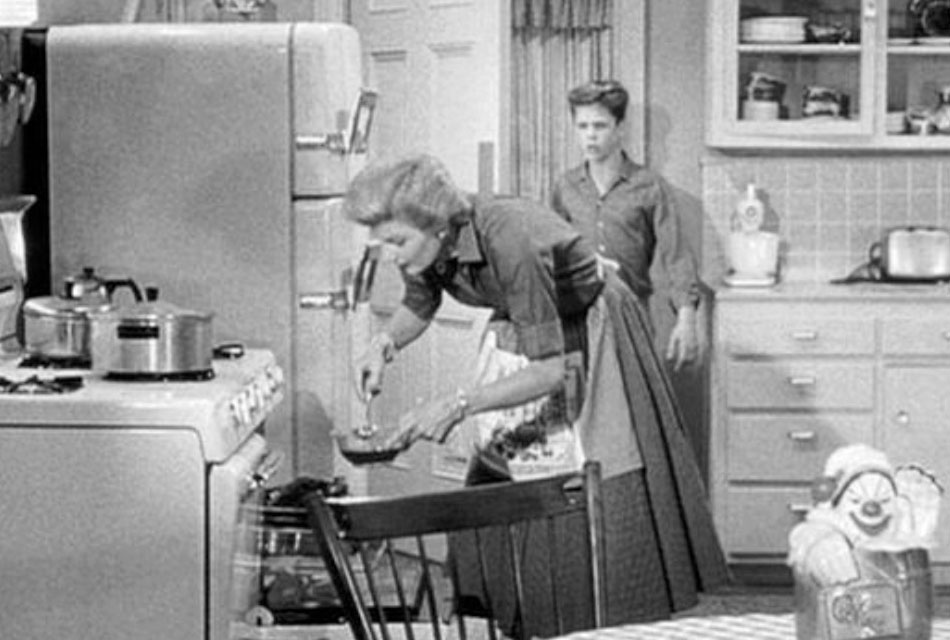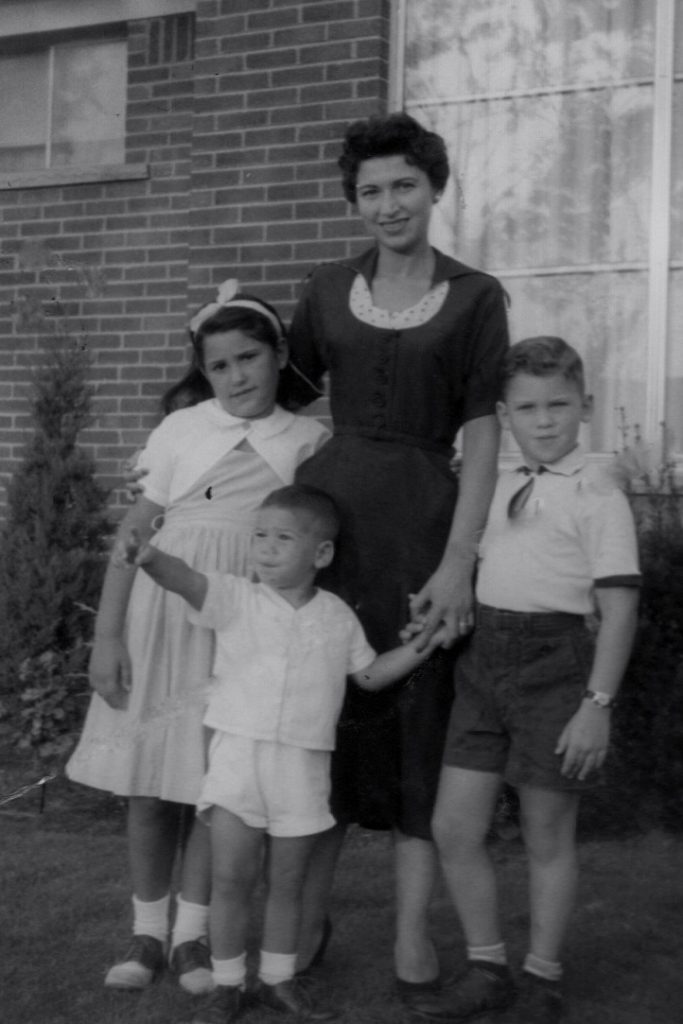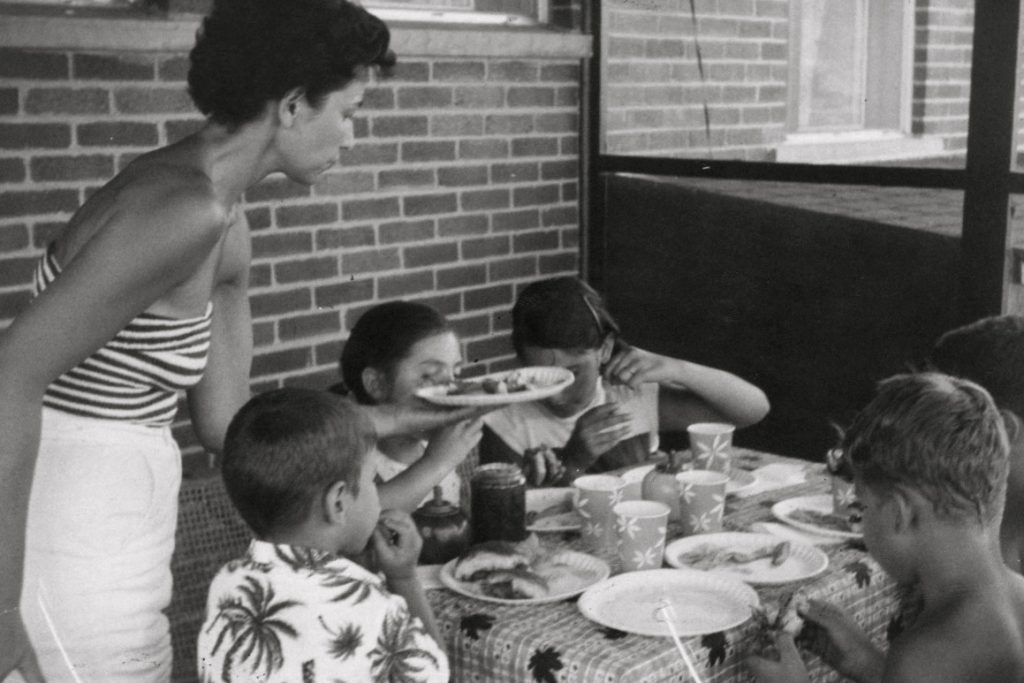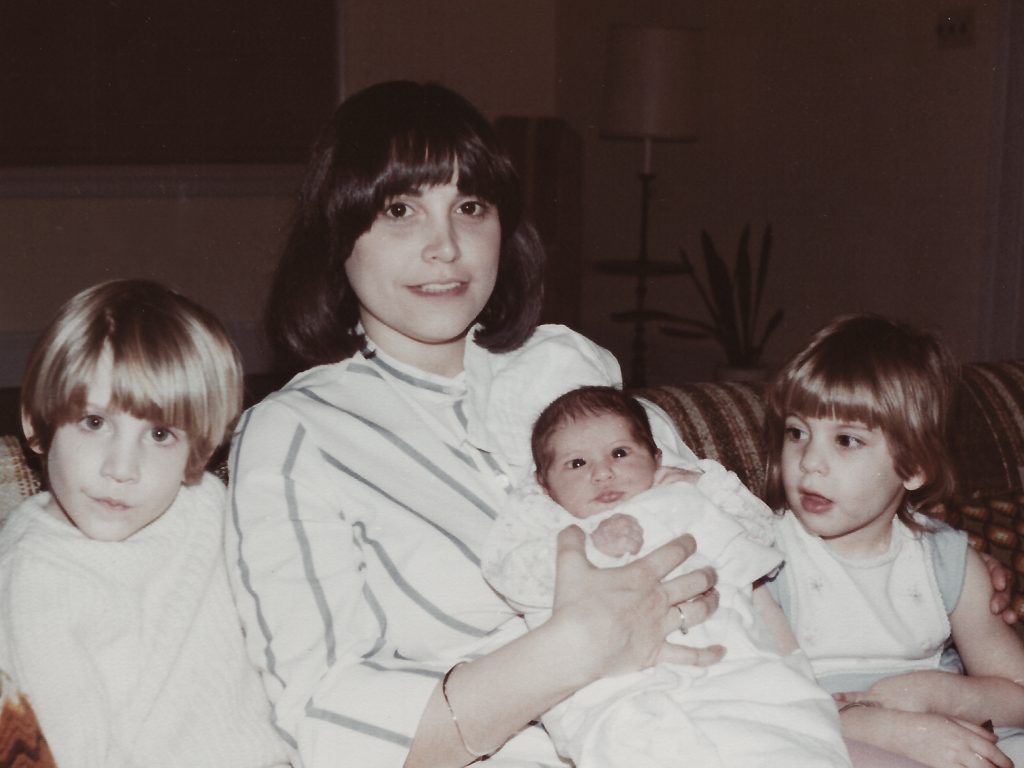
Photo: Mary Kassian — Girls Gone Wise
One of my brothers called our mother June Cleaver. He was referencing the television series Leave It to Beaver in which June (played by Barbara Billingsley) kept house, took care of Wally and Beaver, and catered to her husband Ward. I’m not sure if my mother enjoyed being teased this way or if she felt flattered by the comparison. Nevertheless, when anyone asked what she did, she labeled herself “just a housewife.”
This Mother’s Day, I salute my mother and all who understand and appreciate the importance and challenges of what she called being “just a housewife.”
Growing up in the fifties, it was a given in my circle that mothers were the stay-at-home parent. Keeping house back then was far more labor intensive than it is in 2021. We did not have air conditioning, so open windows meant more to dust and vacuum. Until we got a clothes dryer in the sixties, my mother hung clothes out to dry and ironed them. Without the conveniences we now take for granted, things like dish washers and microwaves, meals were a lot of work.
But there were other expectations, at least in my home. My father worked long hours as a CPA, especially during tax season, to bring home the bacon. It was up to my mother to take care of all of our needs. I don’t think my father ever took us to the doctor or dentist, attended parent-teacher conferences or school performances, led our scout meetings, or drove us to an activity (aside from my brothers’ to little league games because he was the coach). The division of responsibilities was clear. Dad worked and Mom took care of hearth and home.
Once we were older, my mother sold Avon cosmetics when we were in school. She was actually good at it but I doubt she earned very much. While we once again teased her, saying “Ding dong, Avon calling,” there wasn’t much opportunity for a non-college educated woman of her era. She never thought she was smart enough to consider any career, even though she had been a good student who was kept from higher education because her father didn’t think women needed it. It was only later in life, when her nest was empty, that she opened an art gallery with a friend and used her social intelligence to sell art and grow a business.
As soon as my first child was born, I was transformed into a stay-at-home parent. My life wasn’t that different from my mother’s. From 1971 until my third child started kindergarten in 1982, I was just a housewife. That was certainly a conversation stopper at cocktail parties. Even getting back into the workforce was a slow process, as I started out by becoming a preschool teacher, a job that afforded me the time to do all things related to the care and upbringing of my children. While my husband was much more hands-on than my father had been, even as I became a full-time worker as director of a preschool, the kids were primarily my responsibility. Luckily, early childhood education was a “family friendly” environment, which meant that any of us could take a personal day to attend to the needs of our kids. I found staying home with three young children stressful at times, but in retrospect it was a gift to spend those “magic years” with them.
None of my children had the luxury of being a stay-at-home parent. They all had careers before starting their families. Pre-pandemic, it took two income to stay afloat and both parents juggled their work demands and the needs of their children. Then COVID-19 hit and everything changed. Someone had to be the stay-at-home parent, and added to that responsibility was being a teacher and caregiver for their children. In most families, it was the mother who stepped back from her job to take on this responsibility. According to Fortune, millions of American women (80% of those who left the left the workforce) became stay-at-home parents.
“One of the main drivers of this disparity is the increased burden of unpaid care—shopping, cooking, cleaning, taking care of kids and parents in the household—which is disproportionately carried by women. Pre-COVID-19, women on average already did almost twice as much unpaid care compared to men. The COVID-19 crisis has added a very uneven addition onto an already unequal baseline. “
The pandemic has given new meaning to stay-at-home parent, with 40% of mothers and 27% of fathers adding what is a part-time job of 15 hours per week to their already busy workloads. This is a necessary and important responsibility. So, this Mother’s Day, I salute all who learned the importance and challenges of what being my mother called “just a housewife.”
I invite you to read my book Terribly Strange and Wonderfully Real, join my Facebook community, and visit my website
Boomer. Educator. Advocate. Eclectic topics: grandkids, special needs, values, aging, loss, & whatever. Author: Terribly Strange and Wonderfully Real.






Laurie, I salute your mother for opening that art gallery after you father retired. In reading your earlier stories, you mother has always sounded like a terrific mother and woman with a whole lot of caring, beauty and smarts; a wonderful role model (June Cleaver comment from your brother, aside).
And there is no doubt that you’ve got all the gumption in the world to found your own pre-school and make a real success of it, after your own kids came along. It’s great that your time was flexible enough that you could still be there when you needed to be for you own children. That’s a win-win.
But your assessment of what has transpired during the pandemic is spot-on. I hear about it in the unemployment numbers almost daily, commiserate with friends I see on social media who are trying to work from home, while attending to their children’s schooling needs. I just can’t believe the stress and fatigue they feel and am not at all surprised that mostly women have dropped out of the workplace to attend to the family. And they won’t come back until schools reliably re-open, or they get childcare again. COVID has exposed the underbelly of the dilemma for working women.
Thanks! You are so right about the impact of the pandemic, Betsy. Mothers (and many fathers) have been so exhausted by the demands of being both full-time workers and stay-at-home parents, but the problem of balancing demands of work and home has existed for a long time.
Your story clearly highlights the fact that taking care of children and home is essential work, and even fulfilling, but is not recognized or rewarded as it needs to be. It is still skewed to disadvantage women most as well. The stresses exacerbated by COVID make this even plainer. Sometimes progress seems so slow, even when so much has changed. Kudos to all the mothers of the world.
Khati, it’s so sad that we have made such slow progress in recognizing the importance of raising children and supporting the parents, caregivers, and teachers who play such an essential part in it. You are right. The pandemic made this a more visible problem. The question now is what will we do as a country to make it better.
Thanx Laurie for a recap on how Covid has thrown a monkey wrench into the already tough stay-at-home decision.
And who said any of this is easy! If our guy Retro friends will excuse me, I’ll remember a Mothers Day card my son once gave me that read:
“It’s hard being a mother, if it were easy men could do it.’
Ha, Dana, I love that card! But many men have stepped up their game as it takes two incomes these days to live a middle class existence. My son and sons-in-law are so much more involved in sharing the work of raising their children.
Wonderful story about three generations of parenting, Laurie. You are practically the only writer on Retrospect who has grandchildren, so you can give the rest of us the long view. Also, you make an interesting point about how much more labor intensive it was to keep house in the ’50s, which is something I never considered. Your pictures are great too (altho it took me a minute to figure out the “Plus 1 lunch” caption). As always, your story gave me a lot to think about.
Thanks, Suzy. The older I get, the longer my view has become. Life is much more challenging for my kids raising their children than it was for me. The pandemic has only made it more obvious.
Your mother sounds terrific, Laurie, and, like so many undersppreciated stay-at-home moms of our parents’ generation. Given her obvious business sense with Avon and the art gallery, don’t you wonder what she would have done had she been born in our generation?
And, speaking of our generation (and beyond), thank you for reminding us that the working mothers of today story is not just a happy one about greater opportunities for women in the workplace . It is often driven by current economic necessities. And can involve very difficult choices and strains.
John, I have no doubt that my mother would have had a successful career if she had the opportunities I had, let alone those of my daughters. I guess in a selfish way, I feel lucky she was home for me and my brothers. I raised my daughters to believe they could have it all, but their lives as mothers has shown them otherwise.
Thankfully the phrase “just a housewife” has pretty much become archaic…unless it’s used tongue-in-cheek. And thankfully being a stay-at-home parent is now, for the most part, a choice rather than a given. I join you in saluting those who of necessity took on the job for however many hours, and under some pretty stringent restrictions. They all deserve a raise!
I wish I could give my mother a “retrospective” raise, as she never earned much money. This lowered her status in the society of her times. And yes, I was trying to be tongue-in-cheek about being just a housewife. Being a stay-at-home parent, regardless of that parent’s gender, should be more valued in our society.
Really good recap, Laurie, and despite my mother being “the anti-June Cleaver,” I salute all moms. You are right, at least some men are stepping up. This past year working on Zoom with some younger men, they were feeding their young kids while their wives were trying to get a couple of hours of work in!
I have to agree on many men of my children’s generation and younger pitching in much more this past year. I know my son and sons-in-law did.
You and I must have gone to the same cocktail parties! Staying home with kids during those years was a joy and a challenge, and I still remember the withering glances from the dress for success crowd. It made me feel like kind of a rebel, going against the tide. As someone with three kids and six grandchildren, ages 2 1/2 to almost 14, I have observed what this pandemic has wrought in the families: one parent “doing school” while the other one works, or doing school AND working if one parent manages the Zooms and assignments better. The emotional toll is something we’ll be observing and reading about for years! Thanks for this insightful piece about–among other things–what it really means to be “just” a housewife!
Risa, I think we have followed some similar paths in life. My grandkids range from ages 7 to 18, and I agree that this past year will sadly have grave repercussions on them. Most of my grandkids were subjected to 15 months of remote “learning,” which required their parents to take on the role of teacher as they also tried to work remotely. It was awful for all of them, but I think the damage this has done to children, socially and in many cases academically, has been underestimated. Our local schools have just reopened with “hybrid learning,” which is a joke. Personally, I think they could have opened schools much sooner.
Another take-away from the stay home/go to work dilemma is this:
When my son was in kindergarten I went back to work. At a meeting of class parents one night the class mother, a working woman herself, . asked for volunteers for something. I volunteered explaining I was not free during the day, but willing to do as much as I could.
“It’s always the working women who volunteer,” she told me, “the others seem to be too busy having their nails done!”
That was a bit mean-spirited of her, but it’s true that if you want something done, ask a busy woman!
I never found that SAHMs were less likely to volunteer. In fact, my experience was the opposite. At that stage of my life, I did a lot of volunteer work and understood that working parents had less time than I did and wanted to spend it with their kids. Maybe different communities?
Forgive that generalization Laurie, which as I said was mean-spirited, and perhaps it was the community.
And truthfully when I was a stay home mom myself during the years my child was in nursery school, the director, knowing i was a librarian, asked me to establish a parenting library which I much enjoyed doing!
It’s fine, Dana. I suspect different communities had different norms.
Laurie, truth is there may have been some spoiled, ladies of leisure types among the parent body in that NYC private school, but I like to think those in my circle of friends were not!